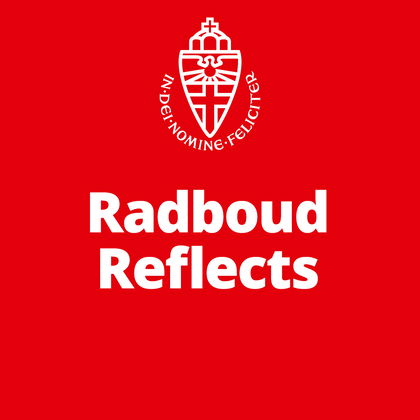Klik op één van de tijden en koop je tickets:
ma 16.06
Participation
• Free admittance for students and Radboud Reflects subscribers
• € 6,00 for Radboud University and Radboudumc employees and Alumni Benefits Card-holders
• € 8,50 for other participants
Payment can be done via iDeal. If you don’t have access to iDeal, contact us via [email protected]
If you participate regularly to our programmes, it could be interesting to buy a Radboud Reflects Subscription.

ma 16.06

Dit programma wordt georganiseerd door Radboud Reflects. Klik hier voor een overzicht van alle lezingen.

Dit programma wordt georganiseerd door Radboud Reflects. Klik hier voor een overzicht van alle lezingen.
Radboud Reflects and Laudato Si’-Institute
This program is English spoken
How can a Zen-Buddhist perspective help us rethink our relation to the planet in the light of the ongoing ecological crisis? Come and listen to philosopher Jason Wirth, who pleads for a transition from political economy to political ecology. Using insights from Buddhist “practices of silence” he argues to establish a radical rethinking of what it means to inhabit the earth.
We are as good as our practice
While ecological challenges grow deeper and more daunting, world leaders are dismissing climate change as a hoax. Reflecting on the current economic and political situation in the United States, Jason Wirth states we need to practice the cultivation of wisdom and compassion. The current crisis, Wirth argues, is not so much a failure of rationality, but a symptom of the poverty of our practice.
From economy to ecology
Philosopher Jason Wirth pleads for a transition from political economy to political ecology. To do so, he claims, we need a re-evaluation of spirituality. In a world where more is never enough, the nub of our spiritual poverty is that we think that the massive accumulation of goods counts as wealth. Our catastrophic relationship to the earth is not born from genetic rapacity, but from initially small decisions that emerge from forms of pain that characterize human living. To change this, we need a new philosophy.
How can we rethink our relation to the earth from a Zen-Buddhist perspective? What does Zen have to do with a transition where ecology takes the place of economy? After his lecture, Jason Wirth will discuss these questions with philosopher Gerard Kuperus. Come and ask your own questions too!
1u 30m
Debat,
1u 30m
Debat

Jason Wirth is professor of philosophy at Seattle University (USA). He works and teaches in the areas of Continental Philosophy, Buddhist Philosophy, Aesthetics, and Environmental Philosophy. His recent books include Nietzsche and Other Buddhas: Philosophy after Comparative Philosophy (2019) and Mountains, Rivers, and the Great Earth (2017).

Gerard Kuperus is a researcher in Integral Ecology in the Dutch Context at the Laudato Si’ Institute of Radboud University. He is specialized in Continental philosophy and Comparative philosophy, specifically Zen Buddhism and indigenous thought.



